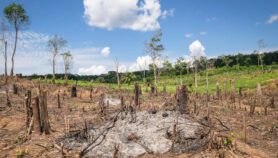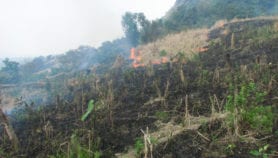Send to a friend
The details you provide on this page will not be used to send unsolicited email, and will not be sold to a 3rd party. See privacy policy.
The world has the technological and financial means to fight climate change, but must act now to make a difference.
This is the conclusion of the latest report from the UN Intergovernmental Panel on Climate Change (IPCC), launched in Bangkok, Thailand today (4 May).
The report proposes multiple strategies to prevent the potentially catastrophic consequences of climate change at a reasonable cost.
It follows discussions involving over 400 scientists from more than 120 countries.
The report states that greenhouse gas emissions must start declining by 2015 if the increase in global average temperature is to be capped at 2–2.4 degrees Celsius.
It says stable emission levels of 445–535 parts per million (ppm) can be achieved with just a three per cent reduction in global gross domestic product (GDP) over the next 25 years, or less than 0.12 per cent annually.
In the long term, 2050 onward, stabilising emissions between 445–710 ppm would require a reduction of 5.5 per cent in the world’s GDP.
"We are talking about the reduction of the world’s GDP, but there will be benefits [in addition to climate change mitigation] such as health benefits from reducing air pollution, improvement of energy security," said Bert Metz, co-chairman of the IPCC’s Mitigation Working Group, who produced the report.
The report recommends several measures, such as switching to renewable energy and biofuels, taxing fossil fuels, incentives for improving the energy efficiency of transportation, buildings and industry, as well as changes to agricultural and forestry practices.
Some delegates from developing countries objected to the wording of the initial draft of the report.
China, with support from Brazil and India, wished to relax emission reduction targets, which pushed for reductions of 50–85 per cent of that recorded in 2000.
Chinese delegates argued that the stringent emission reduction targets would unfairly compromise the country’s economic growth.
According to documents obtained by Agence France-Presse, China also wanted the report to state that developed countries were responsible for 95 per cent of greenhouse gas emissions before 1950, and 77 per cent between 1950 and 2000.
The report acknowledges that developing countries are faced with more barriers to climate change mitigation, such as a lack of technology, funds and policy frameworks.
It recommends further measures to facilitate technology and knowledge transfer to developing countries and include climate change in sustainable development programmes.
IPCC chairman Rajendra Pachauri described the report as "stunning, brilliant, and razor sharp" and hoped it would influence discussions on a replacement for the Kyoto Protocol, due to be discussed in December.
Dadi Zhou, director of China’s Energy Research Institute and an author on the report’s opening chapter, said the report provided realistic projections on climate change.
He said developed countries should take the lead in the fight against climate change, as they have more knowledge in the area. If they can’t reduce emissions, he said, it would be difficult to convince others to do the same.
But Zhou added that developing countries must also take action and factor climate change into sustainable development.
"Developing countries should try to synergise mitigation and sustainable development, and that doesn’t mean that they will have to do the same as developed countries. In the future, they can be even more active in this field," said Zhou.
The report is the third released by the IPCC this year. A fourth is due in November.













